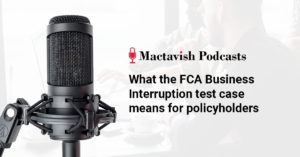
In this update from Mactavish Senior Analyst Emma Murrant we share our views on how to handle notifications arising from Coronavirus related losses.
The decision as to what you should notify and when isn’t an easy one when the situation around you is changing day-by-day. On one hand, an early notification may prompt your insurer to offer guidance on how to manage the situation in line with your policy’s requirements – and to take a more favourable view of any resulting claims, on the other, a notification made now could lead to later losses arising from the event being excluded from future cover at renewal.
The decision is further complicated by the specific requirements of different lines of insurance. In this post we seek to explore some of these complexities and how they apply to Business Interruption (BI) and Directors and Officers Insurance (D&O).
Business Interruption
If your organisation has been impacted by Coronavirus you may well be considering the possibility of future BI claims. Common triggers include:
- Supply chain disruption and interruption
- Site closure or shut down of individual production lines
- Changes to your logistics operations such as moving materials between sites
- Interrupted intergroup trading for international businesses where only part of the business is affected by government action
- Disruption to goods in transit caused by border closures
As with other lines of business, insurers will quite naturally be keen to have as much advance notice of potential claims as possible. As policies which are primarily intended to deal with physical events, insurers tend to require notice of business interruption immediately or ‘as soon as possible’: if this is the case you should seek expert independent advice as soon as you are aware of a potential loss scenario.
Additionally, many policies will require policyholders to notify anything which may give rise to a claim; something that will be difficult to assess here as you may well be unaware of the likely size of any claim as the government is continuing to clarify its plans for supporting businesses as we write. We recommend you check your policy for potential extensions which might respond to the interruption suffered by your business in order to prepare for any notification which can be made as the situation becomes clearer.
For policyholders, notifying in order to maximise the amount collectable whilst complying with policy terms and conditions can be challenging. Where cover is available for coronavirus interruption, it is likely to fall under policy extensions with restricted limits and indemnity periods, so the timing and presentation of any loss will be critical to any recovery.
Directors and Officers insurance
D&O plays an essential role in protecting your executives and board members from investor action as a result of perceived loss of shareholder value. In the current climate, companies that have carried out one or more of the actions below may be vulnerable to future legal action:
- Issued a profit warning
- Suspended a dividend payment
- Suffered an IT breach as a result of poor remote cyber security or internal processes
- Demonstrably failed to mitigate risks arising from the pandemic and its economic impact
Most D&O policies are designed under the ‘claims made’ model (rather than ‘losses occurring’). This means that the insurer whose policy is in place at the time a claim is made against an Insured is liable for its settlement; by contrast, under ‘losses occurring’ policies the insurer who issued the policy at the time of the loss event is on the hook for the claim.
This crucial distinction was introduced to protect insurers from ‘long tail’ risks arising from historic events. In practice, insurers renewing policies will tend to exclude losses resulting from anything you have previously notified as a potential source of claims. This serves to protect the insurer but can leave the policyholder uncovered and without recourse to the protection of either the previous policy or the new one.
Since many D&O policies mandate that all potential claims are notified immediately, this places companies in a difficult position. Failure to notify may invalidate the current policy while premature notification (that does not result in a claim in the short term) may lead to any future losses from that event falling outside your new policy at renewal. This makes the decision particularly difficult to manage – not least if you are due to renew in the next few months.
Conclusions
If you have responsibility for buying and managing insurance we recommend that you immediately review your obligations around notifications across all of your primary insurance lines. Failure to get a grip on this situation now could have very serious consequences down the line.
If you need help to navigate this complex area our team is here to offer expert support and guidance. Our heritage of working on legal reform in the insurance industry combined with our commercial expertise in buying insurance and resolving claims disputes makes us the perfect partner at this challenging time.











